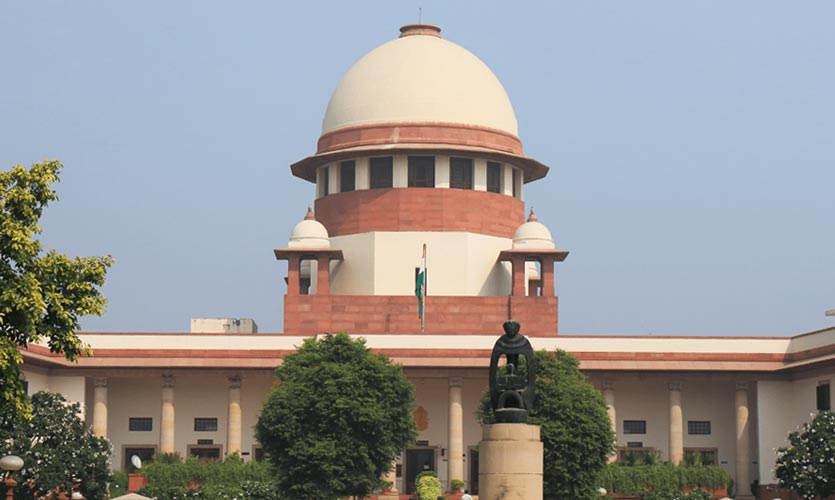The Union government, on Tuesday, said in the Supreme Court that Delhi’s National Capital Territory (NCT) government needs to be restricted from passing laws on matters other than land, police and public order. It also demanded a fresh adjudication by a Constitution bench, to determine the boundaries of the Aam Aadmi Party government’s statutory powers in the national capital.
The Delhi government has opposed the Centre’s views, seeking a quick decision on whether or not it has the executive power to transfer and appoint bureaucrats in the NCT.
The Centre has submitted to the bench headed by Chief Justice of India NV Ramana that the Delhi government is not restricted from passing laws on more than the three subjects specifically enumerated under subsection 3 of Article 239A, and that this aspect should be clarified by another five-judge bench. The bench, comprising Justice Krishna Murari and Justice Hima Kohli, also heard the arguments made by Senior Advocate Dr Abhishek Manu Singhvi appearing for the Delhi government.
The Constitution Bench, in July 2018, had held that the executive power of the Union government, with respect to New Delhi, is limited to land, police, and public order under subsection 3 of Article 239A. Solicitor General Tushar Mehta and Additional Solicitor General Sanjay Jain highlighted that the 2018 judgement does not specifically state the restrictions on the Delhi government.
“Entries 1, 2 and 18 in List-II (public order, police and land) are not the only restrictions against the NCT government. There can be other matters as well outside the legislative powers of the NCT government. The Constitution bench also talked about pragmatic federalism,” said ASG Jain, stating that matters ancillary to the three entries would likewise fall under the purview of parliamentary authorities.
In opposition to the Centre’s submissions, Senior Advocate Abhishek Manu Singhvi appearing for the AAP government, vehemently refuted them, saying that the 2018 Constitution bench verdict clearly defines the powers of the Delhi government. Singhvi asserted that the Centre’s submissions aim to erode the federal structure, and that accepting them would render the Delhi legislative assembly pointless.
During the hearing of a reference on February 19, a two-judge bench comprising Justice Hima Kohli and Surya Kant, differed regarding the authority commanding the Delhi bureaucracy. Accordingly, the matter relating to the transfer and appointments of bureaucrats is being considered by a larger bench.
Although the reference was pending a detailed hearing by the full bench, the central government changed the NCT of Delhi Act in 2021, giving more powers to the Lieutenant Governor by making it mandatory for the Delhi government to seek his opinion before taking any action pursuant to decisions made by the council of ministers, or any other decision made under law in force, within the National Capital Territory.
The court gave the Centre 10 days to respond to the challenge to the 2021 statute since the central government did not file a response. SG Mehta, on the other hand, requested the court to hear both issues together, arguing that the two cases (on Delhi bureaucracy and GNCTD Act, 2021) will have an overlapping effect on each other. “We also argue that the dispute between the two judges (in the 2019 decision) should preferably be resolved by five judges,” he said.
Senior Advocate Singhvi said that the claim was a “red herring”. He stressed that the Delhi government is ready to take a risk by defending its case over the executive authority to transfer officials, independently, even if the 2021 law is deemed legitimate and constitutional.
“There is no central law on transfer and posting. Yet they say we are denuded from framing a legislation. The question is if the Delhi assembly can be denuded from making a law even though there is no parliamentary law on that subject. If such a submission were to be accepted, they (Centre) can control everything in the NCT through executive orders and no law is required at all,” argued Singhvi.
Read more: What Is The Criminal Procedure (Identification) Bill?
He emphasised that the Delhi government needs a legal response on whether it has the authority to legislate under Entry 41 of List-II, which allows a state government to enact legislation governing state public services and the state public service commission. “If I have the power, the next question is whether my using the power of transfer and posting of bureaucrats may have an accidental infringement on the exercise of the Centre’s power with respect to land, police, and public order,” he said.
The court then directed the SG to guarantee that the Centre submits a response on all parts of the case within 10 days. The next date of hearing has been set as April 27.










